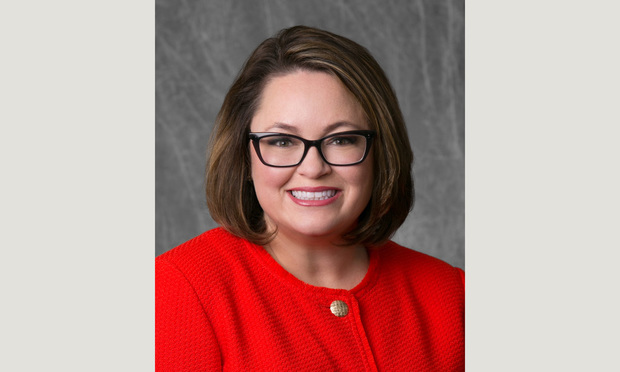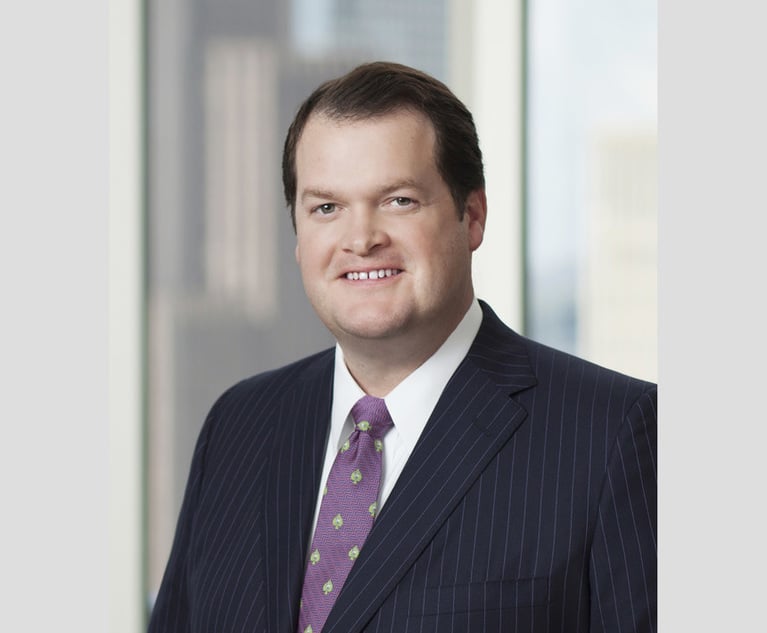The Current State of IP During the Pandemic: A Q&A With Vorys' Carey C. Jordan
Carey C. Jordan, a partner at the Houston office of Vorys, Sater, Seymour and Pease's Houston office and a member of the technology and intellectual…
June 22, 2020 at 10:02 AM
6 minute read
 Carey Jordan, of Vorys, Sater, Seymour and Pease. Courtesy photo
Carey Jordan, of Vorys, Sater, Seymour and Pease. Courtesy photo
Carey C. Jordan, a partner at the Houston office of Vorys, Sater, Seymour and Pease's Houston office and a member of the technology and intellectual property group, spoke recently with Texas Lawyer about the state of intellectual property law during the COVID-19 pandemic and what we can expect once the virus is vanquished.
What's happening in your practice area of IP law? Carey C. Jordan: My area of practice is patent law. I also do some trademark, agreement, post-grant, and litigation work, but my primary day-to-day practice is patent procurement and portfolio management. Our business overall has remained fairly steady in this pandemic because our client base is diversified. Our energy clients are definitely reevaluating some new filings, putting off some decisions, and evaluating their portfolios with respect to upcoming maintenance and annuity fees. They have suffered the double crunch of the pandemic recession plus the decreased demand for oil and resulting glut. We are using our proprietary software called PatentlyIntegrated to help them align abandonment decisions with their business goals so that any cuts they make do not negatively impact their business goals. Our technology clients had a pencils-down approach at first, but have now moved to a more normal type flow of new work. The factors at play there seem to be related to consumer demand as well as fear of the unknown. On the other hand, our medical device and pharma clients are increasing their new filings and have developed new COVID-19 related technologies. Perhaps surprisingly, we have also brought on several new clients, many of whom are small companies or individual inventors who have developed COVID-19 related inventions. So, we are seeing the gamut in terms of responses to this pandemic. Our firm has responded by carefully managing workflow to keep the maximum amount of people busy while maintaining efficiencies for our clients. We have not had to do any layoffs in our group and none are planned at this time. We continue to work from home effectively.
Is the United States Patent and Trademark Office (USPTO) responding at its usual rate or do you think the review of these applications (and other procedures) is taking more time under current circumstances? Interestingly, the USPTO has been ahead of the work-from-home curve for some time. Due to hiring and other issues in Washington D.C., many years ago the USPTO implemented proactive policies that have allowed patent examiners to work remotely from all areas in the country. Thus, we have not seen any change in the frequency or quality of the actions from patent examiners during this time. I suspect not much has changed for the examiners in terms of their everyday work. Some deadlines for the USPTO and other patent offices around the world have been postponed under certain circumstances. Practitioners in our field should keep abreast of those changes to see if they affect any of their clients. Some changes affect hearings and other traditionally in-person types of proceedings. For instance, the European Patent Office just announced that all oral proceedings in opposition scheduled until the 14th of September which have not already been confirmed to take place via videoconference will be postponed until further notice. The French IP office has postponed all deadlines until either July 23 or Aug. 23, depending on the particular case. The Indian IP Office issued a notice confirming that the due date for all deadlines falling during the lockdown period of March 15 to May 17 would be extended until June 1. To help our clients keep abreast of these changes, we have been publishing a running summary and discussion of all changes and deadline extensions in IP offices around the world since the lockdown periods began. Our latest version is available here: https://docs.google.com/document/d/1psift0V_zi8X6bPEUX1ChZSdL7JQwAyeKkFkUMNoOXs/edit?usp=sharing
If this would be helpful to anyone, you can subscribe here to get all updates. https://www.vorys.com/publications-signup.html
What should IP attorneys be doing in response to the changes that have occurred since December 2019?
IP attorneys should keep up-to-date on the current changes in any of the patent and trademark offices around the world in which they have clients' matters pending. As always, practitioners should be cognizant of all dates, and should be managing works so as to use their clients' funds wisely by not taking unnecessary extensions of time or the like. Practitioners should also enable their clients to do strategic analyses of their portfolios in order to ensure that their IP spend is done wisely and cognizant of their business goals. Finding ways to save money while not hurting the quality of the portfolios in these uncertain times can be very helpful to clients. Our patent-pending PatentlyIntegrated system does exactly that.
As to COVID-19 related inventions and new matters, practitioners should work quickly to help clients get patent applications on file as soon as possible. Probably to society's benefit, many smart people are looking at ways to improve many aspects of our lives to reduce the spread or risk of infection. Inventors will want to file sooner rather than later to preserve their rights. The gun starting the race to the patent office has gone off.
What questions should clients or potential clients be asking due to changes in their business, the courts and the process of filing patents? I think clients should be asking their outside counsel to work with them to prioritize projects and control spending in line with what is happening for the client in light of its economic reality. Outside counsel should be proactive in helping their clients deal with these circumstances.
Prospective clients should be looking for counsel who are well-informed about the changes happening in the patent and trademark offices as well as the courts, and who are managing their own people with the care and compassion they deserve. We are all in this together and if your proposed counsel doesn't get that, then that says a lot about them to me.
Carey C. Jordan is a partner in the Vorys Houston office and member of the technology and intellectual property group. She advises large-scale clients on patent prosecution and global intellectual property (IP) portfolio management, agreements (technology transfer, joint development and other research agreements), licenses, transactions involving IP and risk consulting. Carey also has significant experience in crafting and conducting effective and efficient IP due diligence for investments, acquisitions and divestitures. Although experienced in multiple technology areas, her personal sweet spots are in the chemicals and materials science arenas.
NOT FOR REPRINT
© 2025 ALM Global, LLC, All Rights Reserved. Request academic re-use from www.copyright.com. All other uses, submit a request to [email protected]. For more information visit Asset & Logo Licensing.
You Might Like
View All
Energy Lawyers Field Client Questions as Trump Issues Executive Orders on Industry Funding, Oversight
6 minute read
Holland & Knight Hires Former Davis Wright Tremaine Managing Partner in Seattle
3 minute read
Kirkland Is Entering a New Market. Will Its Rates Get a Warm Welcome?
5 minute read
Law Firms Mentioned
Trending Stories
- 1New York-Based Skadden Team Joins White & Case Group in Mexico City for Citigroup Demerger
- 2No Two Wildfires Alike: Lawyers Take Different Legal Strategies in California
- 3Poop-Themed Dog Toy OK as Parody, but Still Tarnished Jack Daniel’s Brand, Court Says
- 4Meet the New President of NY's Association of Trial Court Jurists
- 5Lawyers' Phones Are Ringing: What Should Employers Do If ICE Raids Their Business?
Who Got The Work
J. Brugh Lower of Gibbons has entered an appearance for industrial equipment supplier Devco Corporation in a pending trademark infringement lawsuit. The suit, accusing the defendant of selling knock-off Graco products, was filed Dec. 18 in New Jersey District Court by Rivkin Radler on behalf of Graco Inc. and Graco Minnesota. The case, assigned to U.S. District Judge Zahid N. Quraishi, is 3:24-cv-11294, Graco Inc. et al v. Devco Corporation.
Who Got The Work
Rebecca Maller-Stein and Kent A. Yalowitz of Arnold & Porter Kaye Scholer have entered their appearances for Hanaco Venture Capital and its executives, Lior Prosor and David Frankel, in a pending securities lawsuit. The action, filed on Dec. 24 in New York Southern District Court by Zell, Aron & Co. on behalf of Goldeneye Advisors, accuses the defendants of negligently and fraudulently managing the plaintiff's $1 million investment. The case, assigned to U.S. District Judge Vernon S. Broderick, is 1:24-cv-09918, Goldeneye Advisors, LLC v. Hanaco Venture Capital, Ltd. et al.
Who Got The Work
Attorneys from A&O Shearman has stepped in as defense counsel for Toronto-Dominion Bank and other defendants in a pending securities class action. The suit, filed Dec. 11 in New York Southern District Court by Bleichmar Fonti & Auld, accuses the defendants of concealing the bank's 'pervasive' deficiencies in regards to its compliance with the Bank Secrecy Act and the quality of its anti-money laundering controls. The case, assigned to U.S. District Judge Arun Subramanian, is 1:24-cv-09445, Gonzalez v. The Toronto-Dominion Bank et al.
Who Got The Work
Crown Castle International, a Pennsylvania company providing shared communications infrastructure, has turned to Luke D. Wolf of Gordon Rees Scully Mansukhani to fend off a pending breach-of-contract lawsuit. The court action, filed Nov. 25 in Michigan Eastern District Court by Hooper Hathaway PC on behalf of The Town Residences LLC, accuses Crown Castle of failing to transfer approximately $30,000 in utility payments from T-Mobile in breach of a roof-top lease and assignment agreement. The case, assigned to U.S. District Judge Susan K. Declercq, is 2:24-cv-13131, The Town Residences LLC v. T-Mobile US, Inc. et al.
Who Got The Work
Wilfred P. Coronato and Daniel M. Schwartz of McCarter & English have stepped in as defense counsel to Electrolux Home Products Inc. in a pending product liability lawsuit. The court action, filed Nov. 26 in New York Eastern District Court by Poulos Lopiccolo PC and Nagel Rice LLP on behalf of David Stern, alleges that the defendant's refrigerators’ drawers and shelving repeatedly break and fall apart within months after purchase. The case, assigned to U.S. District Judge Joan M. Azrack, is 2:24-cv-08204, Stern v. Electrolux Home Products, Inc.
Featured Firms
Law Offices of Gary Martin Hays & Associates, P.C.
(470) 294-1674
Law Offices of Mark E. Salomone
(857) 444-6468
Smith & Hassler
(713) 739-1250






